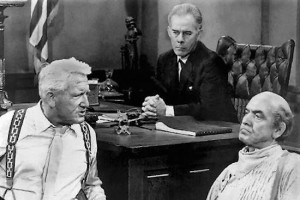Editor’s Note: Last week I wrote a blog post that touched on the relationship between fact and fiction in Sony’s controversial film, The Interview and in another film from 75 years ago, Orson Welles’ Citizen Kane. This week I am honored to present this guest post by Alton Gansky, an accomplished author of more than 40 books and the director of the Blue Ridge Mountains Christian Writers Conference. Gansky also examines the relationship between fact and fiction, this time in the classic movie, Inherit the Wind. I think you will enjoy his perspective.
By Alton Gansky
In January of 2015, Baker Books will release my latest nonfiction work, 30 Events That  Shaped the Church. It comes on the heels of the 2014 release, 60 People Who Shaped the Church. Some are surprised to learn that I write book-length nonfiction. True most of my books are novels but I also enjoy and see great value in producing nonfiction books as well.
Shaped the Church. It comes on the heels of the 2014 release, 60 People Who Shaped the Church. Some are surprised to learn that I write book-length nonfiction. True most of my books are novels but I also enjoy and see great value in producing nonfiction books as well.
While preparing 30 Events I went through a long list of possible topics. In the end, one chapter caught my attention and so infiltrated my mind that I’m still researching it long after I turned the manuscript in. As I worked through the centuries I came upon a week long event that most of us have heard of but few of us know much about: The Scopes “Monkey” Trial of 1925. When I research I try to keep my mind free of bias, which is a difficult thing to do. Still, I thought I knew a fair amount about the “Trial of the Century.” I didn’t.
Part of my preparation was to watch an old movie (1960), based on an older stage play by Jerome Lawrence and Robert E. Lee, Inherit the Wind. I remember it being one of the best movies ever made, made all the more memorable by actors like Spencer Tracy and Fredric March, as well as Gene Kelly (no dancing in this movie), and Dick York (later of Bewitched fame) who portrayed John T. Scopes (Bertram T. Cates in the movie). This time, I watched the movie with a critical eye and was surprised how far they had strayed from the truth.
To be fair, Lawrence and Lee, as well as director Stanley Kramer, went out to their way to alert viewers that they were watching a movie, not a documentary. The movie begins with these words:
“Inherit the Wind is not history. The events which took place in Dayton, Tennessee, during the scorching July of 1925 are clearly the genesis of this play. It has, however, an exodus entirely its own. [. . .] So Inherit the Wind does not pretend to be journalism. It is theatre.”
I appreciate the honesty of the writers. Still—and this is the problem with some types of fiction—many took the events as historical fact. To this day, people who have seen the movie think:
William Jennings Bryan was a glutton. (He was a diabetic on a very strict diet at the time of the trial.)
Clarence Darrow crushed Bryan’s beliefs as the latter sat in the witness stand. (Darrow ridicule people of faith but it had no impact on Bryan.)
That Bryan was a buffoon. (He ran for president three times, was a great orator, served as Secretary of State, and was a gifted writer).
That the townspeople of Dayton wanted to hang Scopes from a tree. (Nothing of the sort happened.)
And that Bryan died in the courtroom, the victim of Darrow’s grueling examination and ridicule of biblical stores. (Bryan died five days later from complications of diabetes. He remained active in the days following the trial.)
When I was in college, my psychology professor told the class that the human mind has trouble distinguishing between reality and fiction. It is the reason we jump in scary movies or tear up reading a sad scene.
All of this to say, that we as author’s of fiction need to take care how we represent figures and events in history. Lawrence and Lee went so far as to change the name of the characters (although they also went out of their way to make the actors look like William Jennings Bryan and Clarence Darrow). Despite their efforts, fifty-four years after the movie (longer for the play the preceded it) people still think the movie is trustworthy history.
This realization puts a burden of responsibility on the shoulders of novelists. While the novelist’s goal is to entertain, we in the Christian market also want to edify and to do so we need to be as accurate as we can be when portraying real people.
William Jennings Bryan’s reputation and work was sullied by the play and later the movie, despite the authors’ and director’s efforts to make clear their story was only loosely drawn from the real 1925 court case. Nonetheless, many have taken the fiction and see it as fact.
We novelist take some needed liberties in our creation, but when it involves real people from the past (or worse, vaguely disguised characterizations of living people), then we run the risk of doing harm.
Alton Gansky has written over 40 books of fiction and nonfiction. His latest work 30 Events That Shaped the Church: Learning from scandal, intrigue, war, and revival releases mid January 2015. He is also the director of the Blue Ridge Mountains Christian Writers Conference. www.altongansky.com – See more at: http://altongansky.typepad.com/writersconferences/2014/12/the-need-for-factual-fiction.html#sthash.dBW1l0nG.dpuf

Comments 1
I find this perspective persuasive and appreciate Alton Gansky’s treatment of Inherit the Wind.
I think that this leads to an interesting point in terms of what we should do as Christian novelists in general. Many people ridicule Christian media as naive, “Hallmark-y,” and simplistic. For example, the 2014 movie God’s Not Dead received a 15% on Rotten Tomatoes, and while Rotten Tomates may not be sympathetic to Christian media (one of my favorite “faith-based” movies, To Save a Life, only received 33%), a critique I saw on the movie summed up what I think is a typical critique of Christian storytelling:
“One of the biggest problems in most Christian genre movies is their lack of edge, a reluctance on the part of the filmmakers to show ugly reality.”
-Roger Moore, Orlando Sentinel
I think, just as Gansky advocates for accurate portrayal of real life individuals, we should make sure to portray reality in Christian media. So many people are turned off to the Christian message because they see it as faith-based irrationality. But when we start showing people that Christianity applies to real people, then we will do better.